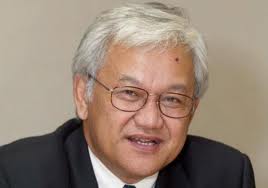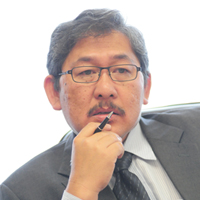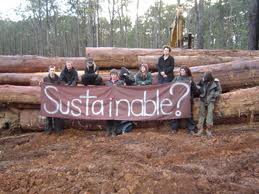 Senator Bob Brown, Leader of Australia’s Green Party
Senator Bob Brown, Leader of Australia’s Green Party
The Leader of Australia’s Green Party, Senator Bob Brown from Tasmania, has issued a statement deploring the fact that the Taib family timber company Ta Ann has once again declared losses in the state.
Ta Ann is the world’s biggest hardwood timber company in terms of market capitalisation, achieving a revenue of over 800 million ringgit last year, a 25% increase on the year before. The company has also declared a 25% profit margin in its latest Annual Report.
Yet, to the fury of environmentalists, the company managed to extract massive public subsidies to set up business inTasmania. It is now extracting timber from the remaining wild forest areas, amid huge controversy.
And, despite those subsidies the company has just announced further losses. Yesterday the senator stated:
“Since it began operation in Tasmania, Ta Ann has made a net loss of about $18 million, despite receiving $10 million in direct public subsidies and being housed in premises which cost Forestry Tasmania $22 million and which it runs at a loss….When public money is poured into poor business models in forestry, we have less to spend on our hospitals, schools and national parks” [Senator Bob Brown]
- Battling like the Penan in Tasmania
Australians overwhelmingly reject logging
The protest comes hard on the heels of a recent opinion poll conducted by the Green Party, showing just how unpopular logging is in Australia. 88% of people surveyed said they want all logging of their wild jungle stopped immediately and that the 570,000 hectares of native forests in Tasmania should be turned into a National Park.
The Greens are therefore demanding to know why an apparently powerful lobby has nevertheless managed to extract such subsidies for Ta Ann and gain the company access to the state, only to see the money wasted?
The poll was carried out late last month:
Question:
As part of the Tasmanian Forest Intergovernmental Agreement, 570,000 hectares of native forests were identified as needing immediate protection. Do you support or oppose the Tasmanian Government protecting the 570,000 hectares of forests by making them National Parks?
Support 85%
Oppose 10%
Neither/Don’t know 5%
Taib family business

- Hamid Sepawi – Taib’s cousin and key crony is CEO of Ta Ann
The concern amongst Tasmanians about the activities of Ta Ann has increased with growing public understanding in Australia about the nature of this Sarawak company and its links to the Chief Minister, who has fabulously enriched his family at the expense of the Borneo jungle and its people.
Ta Ann is widely acknowledged to be one of the main vehicles for Chief Minister Abdul Taib Mahmud’s personal business interests in Sarawak, which he has run like a personal fiefdom for the past 30 years.
Like many of his other wealth creating concerns, Ta Ann is headed by his cousin, the Chief Executive Hamid Sepawi. Sepawi is also the public company’s largest shareholder, controlling a stated 26% of the shares alongside another key Taib crony and political side-kick, Wahab Dolah. Wahab’s brother, Sa’id Bin Haji Dolah, is also a Director on the Board.
Sepawi is listed by Forbes as one of Malaysia’s wealthiest men. However, students of Sarawak affairs recognise him as merely another of Taib’s placemen, or so-called nominees. The usual handsome reward for such services, according to insiders, is 10% of the profits, mainly from timber extraction and oil palm production.
Less than 5% of Sarawak’s virgin forests, which were virtually intact in the 60s, now remain.
It has nevertheless been routine for the handful of crony companies licenced by Taib to strip out the jungle, to post minimal profits and beg for lower royalties, thereby escaping genuine taxation in the State and depriving the people of Sarawak of at least some real compensation for the loss of their unparalleled asset.
Another Taib crony company, Samling, which has an appalling environmental record, has likewise been criticised for logging for years in Guyana, while failing to ever register a profit!
Questions for the Australian authorities
Sepawi also has strong personal as well as business connections with Australia. His wife is Australian and he is believed to have acquired Australian citizenship and to spend most of his time now in his home in Australia.
It is believed he has strategically moved from Kuching, where Taib’s corruption and control of the economy is being increasingly questioned, even by the Malaysian authorities. An official investigation into Taib is now under way under the auspices of Malaysia’s Anti-Corruption Commission.
This raises several questions for the Australian authorities as well, given Sepawi’s immense wealth and his investments in that country. Because, the legitimacy of that wealth and those investments has become increasingly suspect as information about Sarawak leaks out.

The septuagenarian Chief Minister, who also acts as Finance Minister and Planning and Resources Minister, has had total control of every licence and permit issued in the State over the last 30s years.
Taib is also Chairman of the Land and Survey Department, Chairman of the Land Custody and Development Authority, which has taken over control of vast areas of Sarawak in the name of the state and Chairman of the Natural Resources and Environment Board, which sits in judgement on the Environmental Impact Assessments for his own development projects!
Sepawe has been an outstanding beneficiary of what can only be described as rampant nepotism at best in Sarawak, as Taib has taken full advantage of his position to hand out licences to his family and political supporters. Nepotism is corrupt.
In a development just this week Switzerland’s Bruno Manser Foundation issued a strong letter to the Australian Government requesting that the extensive business and property interests of the Taib family and their associates be investigated by the Australian authorities, on the basis that they are the proceeds of extensive corruption and money laundering. Sepawi is one of those key family associates.
Indeed, Australia is believed to be one of the main countries where the Chief Minister has invested the proceeds of his timber corruption. Now, through the activities of Ta Ann, it is also one of the countries that has become enmeshed in the global logging network spawned by the reckless destruction of the Sarawak jungle.

